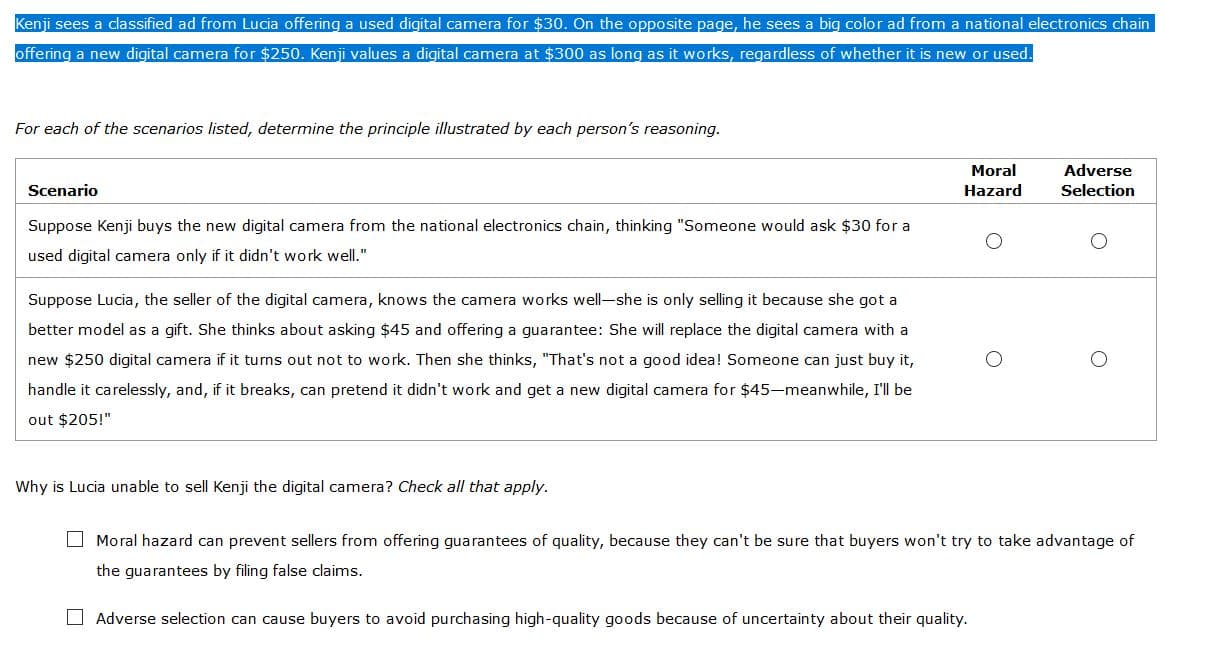Kenji sees a classified ad from Lucia offering a used digital camera for $30. On the opposite page, he sees a big color ad from a national electronics chain offering a new digital camera for $250. Kenji values a digital camera at $300 as long as it works, regardless of whether it is new or used. For each of the scenarios listed, determine the principle illustrated by each person's reasoning. Moral Adverse Scenario Hazard Selection Suppose Kenji buys the new digital camera from the national electronics chain, thinking "Someone would ask $30 for a used digital camera only if it didn't work well." Suppose Lucia, the seller of the digital camera, knows the camera works well-she is only selling it because she got a better model as a gift. She thinks about asking $45 and offering a guarantee: She will replace the digital camera with a new $250 digital camera if it turns out not to work. Then she thinks, "That's not a good idea! Someone can just buy it, handle it carelessly, and, if it breaks, can pretend it didn't work and get a new digital camera for $45-meanwhile, I'll be out $205!" Why is Lucia unable to sell Kenji the digital camera? Check all that apply. O Moral hazard can prevent sellers from offering guarantees of quality, because they can't be sure that buyers won't try to take advantage of the guarantees by filing false claims. O Adverse selection can cause buyers to avoid purchasing high-quality goods because of uncertainty about their quality.
Kenji sees a classified ad from Lucia offering a used digital camera for $30. On the opposite page, he sees a big color ad from a national electronics chain offering a new digital camera for $250. Kenji values a digital camera at $300 as long as it works, regardless of whether it is new or used. For each of the scenarios listed, determine the principle illustrated by each person's reasoning. Moral Adverse Scenario Hazard Selection Suppose Kenji buys the new digital camera from the national electronics chain, thinking "Someone would ask $30 for a used digital camera only if it didn't work well." Suppose Lucia, the seller of the digital camera, knows the camera works well-she is only selling it because she got a better model as a gift. She thinks about asking $45 and offering a guarantee: She will replace the digital camera with a new $250 digital camera if it turns out not to work. Then she thinks, "That's not a good idea! Someone can just buy it, handle it carelessly, and, if it breaks, can pretend it didn't work and get a new digital camera for $45-meanwhile, I'll be out $205!" Why is Lucia unable to sell Kenji the digital camera? Check all that apply. O Moral hazard can prevent sellers from offering guarantees of quality, because they can't be sure that buyers won't try to take advantage of the guarantees by filing false claims. O Adverse selection can cause buyers to avoid purchasing high-quality goods because of uncertainty about their quality.
Principles of Microeconomics
7th Edition
ISBN:9781305156050
Author:N. Gregory Mankiw
Publisher:N. Gregory Mankiw
Chapter22: Frontiers Of Microeconomics
Section: Chapter Questions
Problem 10PA
Related questions
Question
Kenji sees a classified ad from Lucia offering a used digital camera for $30. On the opposite page, he sees a big color ad from a national electronics chain offering a new digital camera for $250. Kenji values a digital camera at $300 as long as it works, regardless of whether it is new or used.

Transcribed Image Text:Kenji sees a classified ad from Lucia offering a used digital camera for $30. On the opposite page, he sees a big color ad from a national electronics chain
offering a new digital camera for $250. Kenji values a digital camera at $300 as long as it works, regardless of whether it is new or used.
For each of the scenarios listed, determine the principle illustrated by each person's reasoning.
Moral
Adverse
Scenario
Hazard
Selection
Suppose Kenji buys the new digital camera from the national electronics chain, thinking "Someone would ask $30 for a
used digital camera only if it didn't work well."
Suppose Lucia, the seller of the digital camera, knows the camera works well-she is only selling it because she got a
better model as a gift. She thinks about asking $45 and offering a guarantee: She will replace the digital camera with a
new $250 digital camera if it turns out not to work. Then she thinks, "That's not a good idea! Someone can just buy it,
handle it carelessly, and, if it breaks, can pretend it didn't work and get a new digital camera for $45-meanwhile, I'll be
out $205!"
Why is Lucia unable to sell Kenji the digital camera? Check all that apply.
O Moral hazard can prevent sellers from offering guarantees of quality, because they can't be sure that buyers won't try to take advantage of
the guarantees by filing false claims.
O Adverse selection can cause buyers to avoid purchasing high-quality goods because of uncertainty about their quality.
Expert Solution
This question has been solved!
Explore an expertly crafted, step-by-step solution for a thorough understanding of key concepts.
This is a popular solution!
Trending now
This is a popular solution!
Step by step
Solved in 4 steps

Knowledge Booster
Learn more about
Need a deep-dive on the concept behind this application? Look no further. Learn more about this topic, economics and related others by exploring similar questions and additional content below.Recommended textbooks for you

Principles of Microeconomics
Economics
ISBN:
9781305156050
Author:
N. Gregory Mankiw
Publisher:
Cengage Learning


Principles of Microeconomics
Economics
ISBN:
9781305156050
Author:
N. Gregory Mankiw
Publisher:
Cengage Learning
